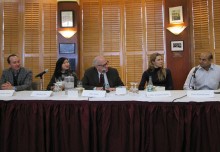
January 26, 2012 — The power of the Internet to influence public policy and economic growth was the topic discussed by a panel of Google policy experts at a special event for Harvard Kennedy School students hosted by the Shorenstein Center, HKS Communications Program, HKS Office of Career Advancement and the HKS student group Tech{For}Change.
Dorothy Chou, Google Policy Analyst, identified Google’s objectives as coordinating worldwide efforts, and looking at long-term perspectives of copyright, privacy and other issues. Google “advocates for data-driven policy,” Chou said, and is focused on “how to turn products into policy solutions…and push the bounds of policy to ensure creative flexibility.” “At Google we believe the Silicon Valley ethos of looking at the data first can be transposed to D.C., London, Brussels,” she explained.
Chou leads Google’s Transparency Report which documents government requests to remove content, as well as traffic reports that display interactive traffic reports that display the accessibility of Google services around the world.
Prem Ramaswami, former Google Project Manager who is now studying at Harvard Business School, spoke about a project he worked on for Google’s foundation, which states its goal as “using technology to solve the world’s biggest problems.” After the 2010 earthquake in Haiti, Ramaswami visited the country and formed a team that used technology in new ways to aid the area, and two years later, the team is working on innovative ways to put technology to work in areas of crisis. A project that came out of Ramaswami’s work is Google’s Public Alerts, which maps out storms, earthquakes and other pending disasters, to alert citizens in those affected areas.
Google is hiring, said Chris Woods, Head of Global Industry Relations and former HKS student. “We are looking for people who are smart, intellectually curious…[and] from diverse backgrounds.” Carley Graham Garcia, Manager of Global Industry Relations, added that Google offers a policy fellowship, and applications are still open. While Google is a large company to work for, she said, there are many self-selecting affinity groups that help to “create a sense of community” among employees. Encouraging students to think about working at Google, Ramaswami said that the majority of Google employees “feel a certain passion and belief in the power of information and the Internet…and truly believe it’s doing good for the world.”
Alex S. Jones, director of the Shorenstein Center and moderator of the event, asked the panel about the previous week’s events surrounding the Stop Online Piracy Act (SOPA). Chou stated that “we are able to align ourselves, one, with the open web, and two, with the needs of our users.” She continued, “Data-driven policymaking is what we should be moving toward,” and so if the government looks at policy by numbers, “we wanted to show the numbers…and the effects on jobs and people on the ground.” Ramaswami agreed, and added that SOPA was “created in a vacuum not understanding the fundamental fabric of the web.”
By Janell Sims, Shorenstein Center.
Photos by Heather McKinnon, Shorenstein Center.

